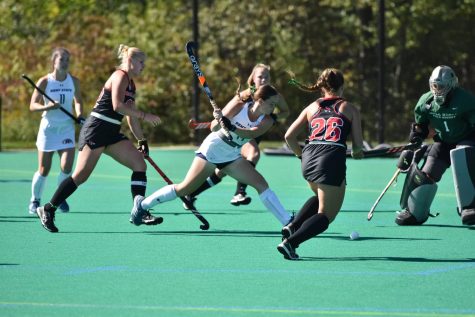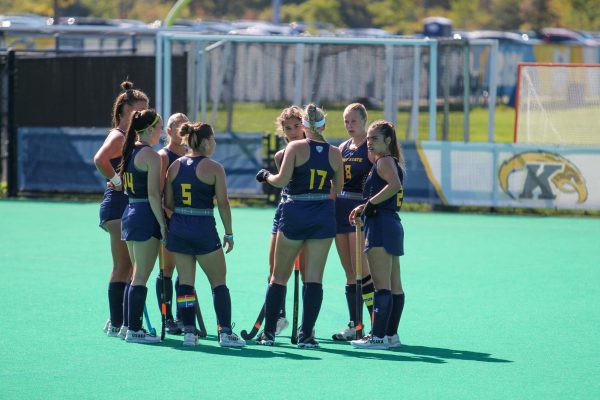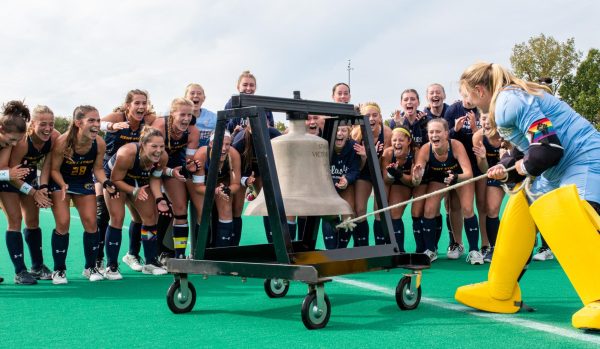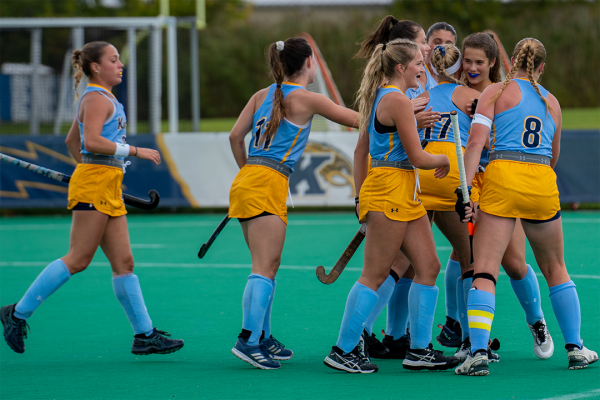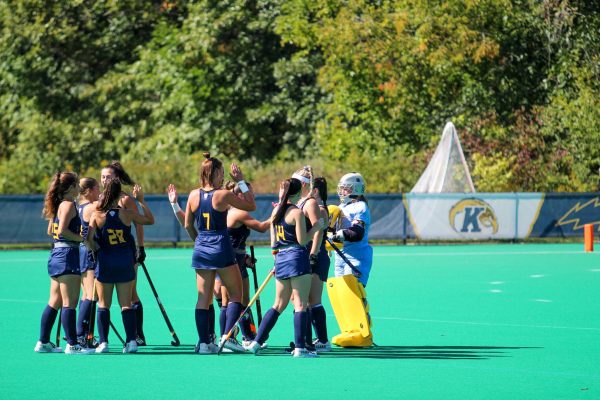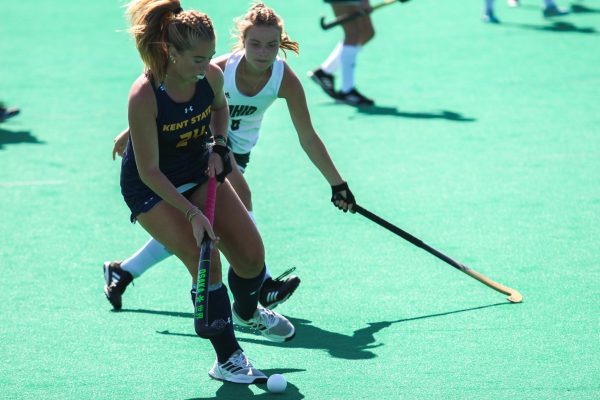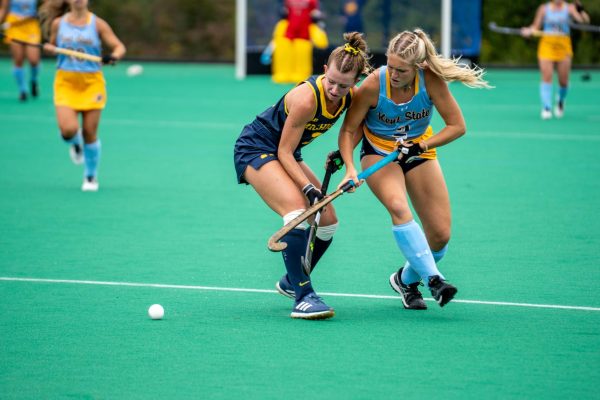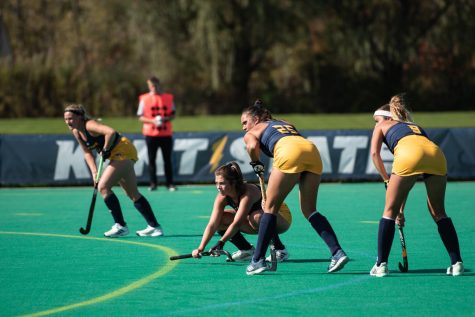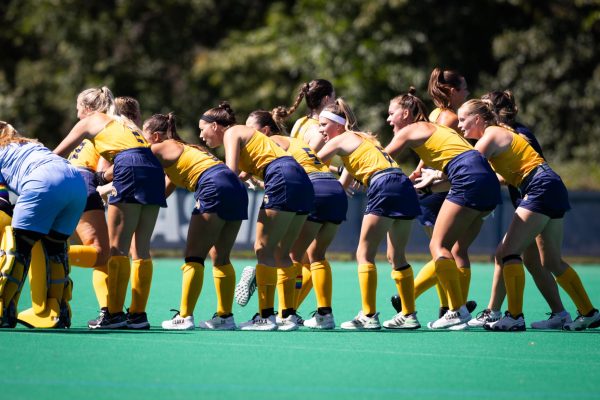Field hockey adjusting to a unique season
March 14, 2021
Azure Fernsler, Danielle Hamm and the rest of the Kent State field hockey team arrive at Murphy-Mellis Field ready for practice on a cold, snowy February Tuesday. The pitch is covered with several inches of snow, and the team soon realizes they will need to shovel the pitch in order to practice. After shoveling, Fernsler, Hamm and the rest of the field hockey team can resume practice for the upcoming season.
Snow on the pitch is unusual for a team which normally plays in the fall. Field hockey was one of the multiple sports moved to the spring semester due to COVID-19.
Last year, many college sports conferences announced that their fall sports seasons would be moved to the spring and the Mid-American Conference was no exception.
The sports affected included men’s and women’s cross country, field hockey, football, men’s soccer, women’s soccer and women’s volleyball. Football was later returned to the fall.
“With the state of what was going on in college athletics at the time it didn’t really surprise us,” coach Kyle DeSandes-Moyer said. “We had seen countless other conferences going through similar announcements. It was disappointing for us because we were excited for the season, but based on what was happening within college athletics, it just seemed like a smart decision just regarding student athlete health and well-being.”
DeSandes-Moyer and the rest of the coaching staff broke the news to the team at a virtual team meeting.
Fernsler, one of four seniors on the roster, was looking forward to playing in the fall, but she knew that the NCAA would likely grant the players another year of eligibility or let them play in the spring. She was at home visiting her family for the weekend when she found out about the news.
“It was sad and disappointing because we were really looking forward to the upcoming fall,” Fernsler said. “Overall, for it being our senior season I know we were sad for sure and we’re grateful to be able to play right now in the spring.”
Hamm, one of five freshmen on the roster, expected the season to be postponed because a lot of other schools and conferences had already done the same.
“I was upset because I’m a freshman and I felt like I got ripped of the first-year experience that everyone else got,” Hamm said.
Despite the season being postponed, Hamm was able to move to Kent a week earlier than normal to start the mandatory quarantine process before workouts could begin.
The team did not start with daily full team practices everyday right away. The beginning of the fall semester started with three full team practices a week with individual skills sessions mixed in as well. By the end of the semester, the team was practicing similarly to how it always had.
Typically, the fall semester is filled with traveling and games. But this fall was focused more on training, getting back into shape and adjusting to certain COVID-19 protocols. The team only trained during the week in the fall semester and had weekends off.
“We really had to make some adjustments, especially with having to quarantine a couple of times due to COVID,” Fernsler said. “We were able to practice and lift and our team really adapted to what we had to do to make sure that we were able to continue practicing and get touches on the ball and just be together.”
The protocols the team has to follow includes getting tested once a week, which will turn into twice a week when games start, and wearing masks except when the players are playing on the pitch.
With the fall semester being the offseason, there were changes made to team bonding activities.
“We did Zoom team bonding and the fall was different in the sense that usually with the freshmen we jump right into it,” Fernsler said. “We’re always on the move, always doing things and we’re together 24/7. So with that not happening, we had to really make a conscious effort to do things together that were safe.”
In the spring, the team has switched to conditioning twice a week and only having Mondays off.
“We practice on the weekends now and it’s been more challenging because of the snow on the turf,” Hamm said. “We have to have flexible schedules because if we are practicing inside it’s a different time then if we were outside practicing.”
One of the main challenges in preparing and playing in the spring is the weather. Usually, the team is able to practice outside without having to worry about snow. But this spring has forced them to practice on the track or turf in the field house.
“The turf we normally play on is a lot smoother,” Hamm said. “It’s called AstroTurf and it’s flat like a carpet. The field house turf has field turf which is a lot thicker and harder to play field hockey on because the ball doesn’t roll as well on field turf. So, we have to change what we’re doing and thinking because our passes may not be as good. If we’re inside we might play on the track too which is hard because the ball moves very fast and it’s hard to keep up with.”
Under normal circumstances, the team usually has two and a half weeks from the start of practice to prepare for the first game of the season, but now, the team has been in offseason mode since fall 2019.
“[Usually,] we’re hitting the ground running practicing two times a day in the fall,” DeSandes-Moyer said. “Having a longer offseason definitely gives us more time to make sure everyone is on the same page and in the same sort of physical condition and ready to go for the game.”
Coming back from winter break, the team was in good physical shape and the freshman class looked very strong, according to DeSandes-Moyer.
“Our team came back from winter break in a really good space,” DeSandes-Moyer said. “Our freshmen are a very strong class and I think every single one of them will see the field this semester.”
The schedule for this upcoming season consists of 12 conference matches and two matches against incoming MAC member for the 2021-2022 season, Bellarmine University.
With the exception of the first weekend only having one match, the matches will be played on Fridays and Saturdays against the same opponent over one weekend, at one location. Also, there will be no end-of-season conference tournament, meaning whoever leads the standings at the end of the regular season will be the MAC qualifier for the NCAA tournament.
“I think the schedule itself is super unique,” DeSandes-Moyer said. “It’s definitely a new challenge for our team in a couple different ways. Physically playing back-to-back matches is a challenge and just being mentally prepared and playing the same opponent two days in a row can be a big challenge.”
DeSandes-Moyer, Fernsler and Hamm are all looking forward to the same thing in this upcoming unique season: getting to play in real, competitive matches together.
“I’m really looking forward to competing with the team and the energy that we all bring when we show up on game day,” Fernsler said. “The atmosphere before games is really exhilarating and something that I’ll definitely remember and cherish forever.”
Kathryn Rajnicek is a sports reporter. Contact her at [email protected].












